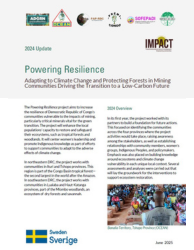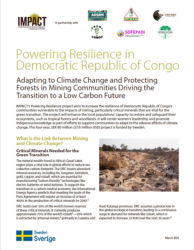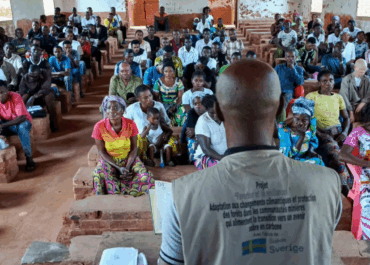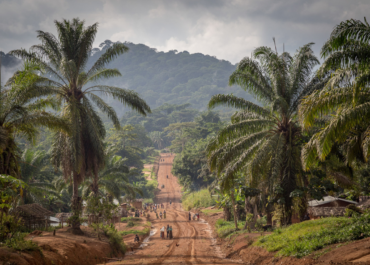Powering Resilience

Adapting to Climate Change and Protecting Forests in Mining Communities Driving the Transition to a Low Carbon Future
The Powering Resilience project aims to increase the resilience of Democratic Republic of Congo’s communities vulnerable to the impacts of mining, particularly critical minerals that are vital for the green transition. The project will enhance the local populations’ capacity to restore and safeguard their ecosystems, such as tropical forests and woodlands. It will center women’s leadership and promote Indigenous knowledge as part of efforts to support communities to adapt to the adverse effects of climate change.
Key Activities in the Powering Resilience Project:
1. Improve the restoration and protection of forest ecosystems by DRC communities affected by mining and vulnerable to climate change.
By strengthening the knowledge and technical capacity of local stakeholders—specifically women and Indigenous Peoples—communities will be able to implement actions to restore and protect degraded forests and woodlands through an Ecosystem-based Adaptation (EbA) approach.
All proposed EbA solutions will be based upon analysis and developed together with communities through participatory governance mechanisms. Communities will be incentivized to further carry out ecosystem restoration and protection, through the valuation of ecosystem services such as food or wood, creating new economic opportunities and replacing those currently threatened by climate change.
2. Improve ecosystem governance in DRC’s forest-dependent and mining-affected communities.
The resilience of communities in the context of climate change depends largely on the governance of local ecosystems. Their inclusive governance—including giving voice to women, youth, and Indigenous Peoples in decision making—is essential. The project aims to strengthen and support community mechanisms, as well as aims to support Indigenous and gender representation within government structures. Capacity building for women, youth and Indigenous Peoples will strengthen leadership skills, and conflict mediation will ensure communication actions towards ecosystem restoration and safeguarding are more sustainable.
3. Improve consideration of community interests in plans and strategies which protect ecosystems and biodiversity, or critical mineral production in DRC.
To help draw the link between ecosystem management and mining, the project will hold participatory, consultative workshops with community members, women, youth, and Indigenous Peoples. These consultations will develop and review strategies for ecosystem governance at all levels, as well as support communities to create and disseminate recommendations integrating their interests.
Regions of intervention:
In northeast Ituri and Tshopo provinces: Planned project sites are in Banalia territory in Tshopo Province, as well as Mambasa territory in Ituri Province. These are artisanal gold and diamond mining communities.The ecosystems in these communities are tropical rainforests, part of the Congo Basin tropical forest.
In southeast Haut-Katanga and Lualaba provinces: Planned project sites include
Mutshatsha territory in Lualaba Province and Kambove territory in Haut-Katanga Province. This is a region known for large-scale and artisanal cobalt and copper mining. The ecosystem is a dry forest and savannah (also known as woodlands), part of the Miombo woodlands.
What is Ecosystem-based Adaption?
Ecosystem-based adaptation (EbA) approaches focus on ecosystem and biodiversity restoration and protection, as part of a strategy to help communities adapt to the negative impacts of climate change. EbA is a nature-based solution that integrates a holistic approach to address climate change. For example, protecting communities from extreme weather or contributing to climate change mitigation by reducing emissions that occur from ecosystem degradation.
Implementing Partners
IMPACT is implementing the project in collaboration with the following partners in Haut Katanga and Lualaba Provinces:
Action pour le Développement et la Gestion des Ressources Naturelles (ADGRN), and Protection des Écorégions de Miombo au Congo (PREMI-Congo)
IMPACT is implementing the project in collaboration with the following partners in Tshopo and Ituri Provinces:
Organisation Congolaise des Écologistes et Amis de la Nature (OCEAN), Programme d’Appui aux Populations forestières en République Démocratique du Congo Les Pygmées Aussi (PAP-RDC), Solidarité Féminine pour la Paix et le Développement Intégral (SOFEPADI), and Tropenbos DRC
Funding

Powering Resilience is a SEK 80 million € ($7.6 million USD) project funded by Sweden, implemented over four years (2024-2027).
Recent Highlights

Powering Resilience: Key Results in 2024
June 2025
Learn more about the achievements from Year 1 of implementation of the Powering Resilence Project .


